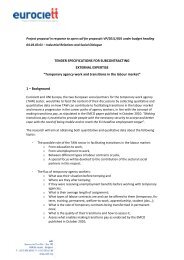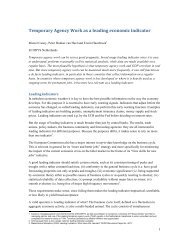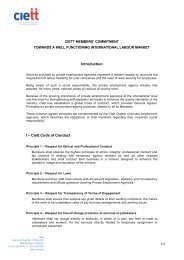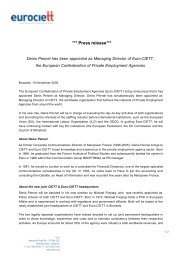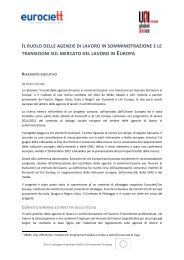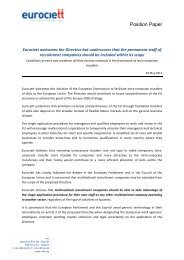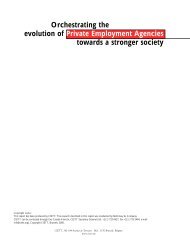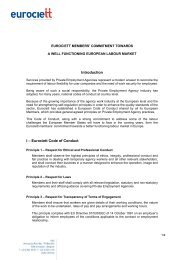Position Paper - Eurociett
Position Paper - Eurociett
Position Paper - Eurociett
Create successful ePaper yourself
Turn your PDF publications into a flip-book with our unique Google optimized e-Paper software.
<strong>Position</strong> <strong>Paper</strong><br />
<strong>Eurociett</strong> <strong>Position</strong> on European Parliament’s Report on the<br />
Implementation of the Services Directive<br />
Temporary work agencies should enjoy the freedom of establishment and<br />
the freedom to provide services<br />
20 September 2010<br />
<strong>Eurociett</strong> Assessment and Main Recommendations<br />
As the European Confederation of Private Employment Agencies, <strong>Eurociett</strong> recalls that<br />
temporary work agencies are important service providers in the European single market,<br />
which provide more work opportunities for more people and serve both companies and<br />
workers.<br />
Temporary work agencies are employing on average 3 million workers (FTE) and 10 million<br />
on a yearly basis, accounting for 1.7% of the workforce. Temporary agency work<br />
contributes to a better match of labour demand and supply and promotes more inclusive<br />
labour markets. As a service provider, temporary agency work is a key driver of job<br />
creation in Europe.<br />
Against this background of the European Parliament’s debate 2 on the implementation of<br />
the Services Directive, <strong>Eurociett</strong> advocates that more action is needed to strengthen the<br />
single market for temporary agency work services:<br />
1. For temporary agency work, a sector currently excluded from the scope of the<br />
Services Directive, more action is needed to grant temporary work agencies the<br />
freedom of establishment and the freedom to provide services as provided by the<br />
EU Treaty, which will boost job creation and enhance labour market participation.<br />
2. The full implementation of the EU Directive on Temporary Agency Work,<br />
particularly its Article 4 on the review of restrictions, is an important step in this<br />
context. Member States should take their responsibility seriously and lift existing,<br />
unjustified restrictions (Article 4 of the Directive).<br />
3. In a medium-term perspective, temporary agency work needs to be included<br />
within the scope of the Services Directive to grant the sector the full freedom of<br />
establishment and the freedom to provide services. Article 5 of the Directive on<br />
temporary agency work will in this context ensure an appropriate protection of<br />
temporary agency workers based on the principle of equal treatment.<br />
2<br />
Draft report prepared by Evelyne Gebardt on the implementation of the Services Directive and<br />
the Draft Opinion of the European Parliament’s Employment Committee prepared by Jean-Luc<br />
Bennahmias.
1. More action is needed to grant temporary work agencies the freedom of<br />
establishment and the freedom to provide services<br />
1.1. Surveys on the motives for using temporary agency work illustrate that temporary<br />
work agencies serve both companies and workers. Companies refer to temporary<br />
agency work to absorb demand peaks, cover short-term staff leave and facilitate<br />
recruitment. 3 Workers refer to temporary agency work to find permanent<br />
employment, enhance their skills and to gain work experience. 4<br />
1.2. Temporary work agencies are currently still discriminated against, as their activities<br />
are limited by a large number of unjustified and outdated restrictions. Such<br />
restrictions include for example the compulsory exclusivity of temporary agency<br />
work activities, sectoral bans, too narrow reasons for use or too short maximum<br />
length of assignments. These restrictions hinder temporary work agencies in fully<br />
enjoying the freedom of establishment and the freedom to provide services as<br />
granted by the EU Treaties.<br />
1.3. <strong>Eurociett</strong> research (2007) 5 illustrated the job creation potential associated with the<br />
removal of some of the unjustified restrictions. 570.000 additional jobs could be<br />
created in just four European countries (Belgium, France, Germany and Spain), if<br />
two unjustified restrictions (sectoral bans and limited reasons for use) were<br />
removed.<br />
1.4. The freedom to provide temporary agency work services should furthermore be<br />
strengthened by addressing administrative problems linked to the posting of<br />
workers, particularly in the area of the access to information and administrative<br />
cooperation between EU Member States.<br />
In this context, <strong>Eurociett</strong> would like to underline that the Directive 2008/104/EC on<br />
temporary agency work will reinforce the protection of posted temporary agency<br />
workers, as these will benefit from the principle of equal treatment (while allowing<br />
for a limited number of derogations) when being posted to other EU Member<br />
States.<br />
1.5. The need for strengthening the European single market for temporary agency<br />
work services is in the interest of companies and workers and should therefore be<br />
recognised in the Report of the European Parliament.<br />
2. A full implementation of EU Directive on temporary agency work will help<br />
to remove several unjustified restrictions<br />
2.1. The EU Directive on temporary agency work, adopted in 2008, is an important, first<br />
step to unlock the potential of temporary work agencies, as it recognises the<br />
3 Ciett (2010): The agency work industry around the world. Economic Report 2010, p. 63-64<br />
4 Ciett (2010): The agency work industry around the world. Economic Report 2010, p. 37<br />
5 <strong>Eurociett</strong> (2007): More work opportunities for more people. Unlocking the contribution of private<br />
employment agencies to better functioning labour markets.<br />
2/3
contribution of temporary agency work to better functioning labour markets, job<br />
creation and the development of flexible forms of working.<br />
2.2. Article 4 of the Directive on temporary agency work requires Member States to<br />
review existing restrictions imposed on temporary agency work and to verify,<br />
whether these are justified to protect temporary agency workers or to ensure that<br />
the labour market functions properly. Unjustified restrictions must be lifted.<br />
2.3. In addition to the review of restrictions, the EU Directive on temporary agency<br />
work provides a common, European framework for the protection of rights and<br />
working conditions of temporary agency workers based on the principle of equal<br />
treatment (Article 5), while allowing for flexibility in the way it is implemented at<br />
national level.<br />
2.4. The sectoral social partners for the temporary agency work sector, <strong>Eurociett</strong> and<br />
Uni-Europa have explicitly supported the need to remove unjustified restrictions in<br />
a joint declaration on the Directive on temporary agency work in 2008.<br />
2.5. In the context of recommendations for sectors excluded from the Services<br />
Directive, the EP Report should therefore call for a full implementation of the EU<br />
Directive on temporary agency work, particularly its Article 4 on the review of<br />
restrictions faced by temporary work agencies.<br />
3. In a medium term perspective, temporary agency work should be included<br />
within the scope of the Services Directive<br />
3.1. At this stage, EU Member States should be encouraged to complete the<br />
implementation of the Services Directive.<br />
3.2. At the same time, considerations should be started for improving the effectiveness<br />
of the Services Directive with a view to proposing amendments in 2011 as<br />
foreseen by Article 41. In this context, <strong>Eurociett</strong> calls for including temporary<br />
agency work within the scope of the Services Directive.<br />
About <strong>Eurociett</strong><br />
The European Confederation of Private Employment Agencies is the authoritative voice<br />
representing the common interests of the agency work industry in Europe. <strong>Eurociett</strong> members<br />
are active in the fields of temporary agency work, outplacement, recruitment and training.<br />
<strong>Eurociett</strong> gathers 27 national federations from EU and EFTA countries, and 6 of the largest<br />
international staffing companies. More information about <strong>Eurociett</strong> is available online:<br />
www.eurociett.eu<br />
3/3







